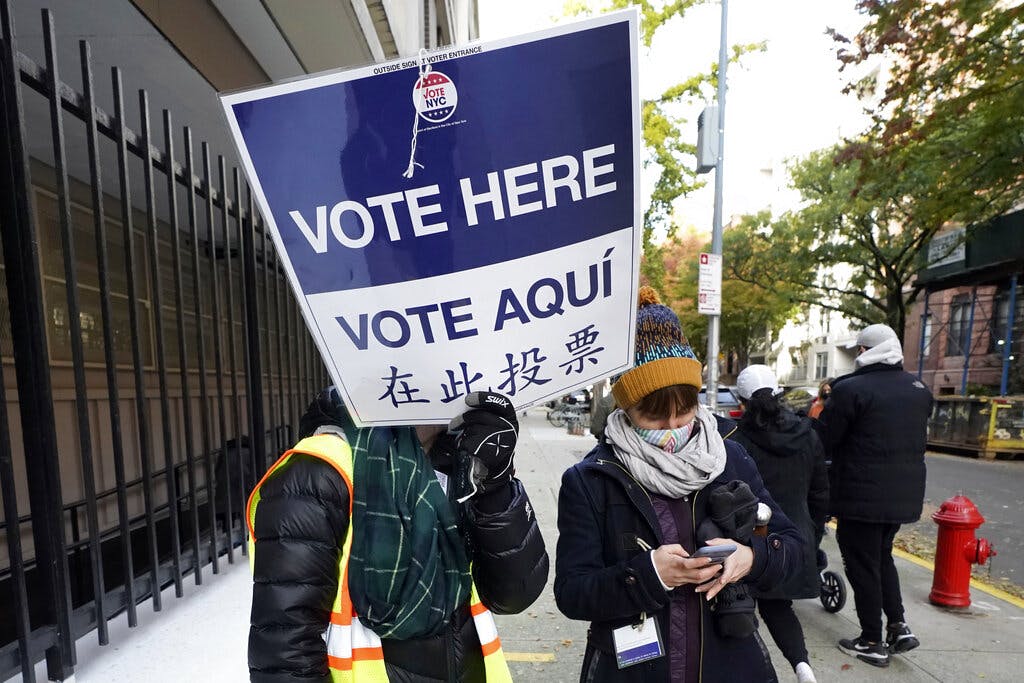Parties Pick Their Battles Weeks Before the Midterms
‘Despite what we assume about money in politics, parties don’t have unlimited funds and so want to maximize the impact of their spending,’ one analyst tells the Sun.

With the midterm elections only weeks away, both the Republicans and Democrats are shifting money between states and, in doing so, are broadcasting their priorities and perceptions of Senate races across the country.
In Ohio, national Democrats appear to have tapped out of the Senate race, while Republicans are flooding the state with money and the airwaves with ads. In sum, the GOP has poured about $38 million into the race while Democrats have spent $24 million.
The difference in total spending demonstrates that the state is a priority for national Republicans, as about 90 percent of the money spent to support the Republican candidate, venture capitalist J.D. Vance, has come from national committees.
Mr. Vance’s campaign has raised some $3.6 million, while the Democratic candidate, Congressman Tim Ryan, has raised some $20.2 million, accounting for the vast majority of the $24 million spent on the Democratic side.
A campaign manager for Mr. Ryan, Dave Chase, called the big outside spending in support of Mr. Vance a “bailout” from Minority Leader McConnell and a signal of confidence in Mr. Ryan’s chances of winning.
“Tim Ryan has defended his lead with no outside spending from national Democratic groups,” he tweeted. “Pennsylvania is now the only Democratic pick up polling better than us.”
As it stands now, forecasters are divided on who is leading in the race, with RealClearPolitics showing Mr. Vance up by 1.4 points and FiveThirtyEight showing Mr. Ryan up by 0.3 points in their respective averages of polls.
The director of the Institute for Politics at Florida State University, Hans Hassell, says parties are likely to keep shifting money around to maximize their investments, and these shifts reflect party leadership’s perception of a race’s competitiveness.
“Despite what we assume about money in politics, parties don’t have unlimited funds, and so want to maximize the impact of their spending,” he said. “Their spending is a reflection of what they perceive the reality to be on the ground.”
In the same way that national Democrats have largely pulled out of Ohio, national Republicans look as if they’re pulling out of New Hampshire.
The National Republican Senatorial Committee, led by the junior senator of Florida, Rick Scott, has pulled $2.7 million of its $9 million investment in the state.
While the Senate Leadership Fund, a committee closely aligned with Minority Leader McConnell, has not yet pulled any of its $23 million in ad buys in New Hampshire, the NRSC move is reminiscent of when national Republicans slashed spending in Arizona.
In late August, the Senate Leadership Fund cut $8 million in ad buys, about half of its investment, in Arizona. About a month later, in September, the committee pulled its remaining $10 million.
Although the president of the committee, Steven Law, said it pulled the money because new “Republican outside forces” had stepped in to fill its shoes, those forces only filled $7.5 million of the $10 million gap and the Republican Senate nominee there, Blake Masters, continues to trail in the polls.
These “Republican outside forces” will be going up against one of the top fundraising candidates of 2022, Senator Kelly, who has raised more than $54 million for his campaign, according to the Federal Elections Commission.
Among these outside forces is tech mogul Peter Thiel, who returned to fundraising after getting Messrs. Vance and Masters nominated and then disappearing.
Mr. Thiel hosted a fundraiser for Mr. Masters at his home in Southern California on September 30, where tickets ranged between $1,500 and $11,600. The amount raised is not publicly available.
A political scientist at John Jay College, Brian Arbour, suspects that the ad cuts in New Hampshire might be an early sign of a gradual withdrawal of money from the race generally.
“New Hampshire is a very expensive state to advertise in because you have to advertise out of Boston,” he said. “Bang from your buck there is particularly low.”
Likewise, he says Democrats could withdraw funds from North Carolina in the coming weeks, as the state has consistently eluded Democrats in recent elections.
Funds from these two races would likely go to Nevada, Georgia, or Pennsylvania, key states on this year’s Senate map, and Wisconsin could be a venue for investment as well.
Nevada in particular has received “a lot less attention than you would think” from both the press and the parties, according to Mr. Arbour. Even though both Democratic and Republican Senate campaigns there are comparatively underfunded, the race is a dead heat.
In Nevada, Senator Cortez Masto, a Democrat, has outspent her opponent, Attorney General Adam Laxalt, by $20.5 million to $7.4 million. However, Mr. Laxalt has enjoyed more support from outside groups.
In terms of total spending in Nevada, Mr. Laxalt has more financial support, with about $30 million being spent on ads supporting him. Ms. Cortez Masto has seen very little outside support, according to AdImpact, a firm that tracks and projects political ad spending.
For comparison, the Democratic nominee in Pennsylvania, Lieutenant Governor John Fetterman, has spent $20.6 million of his own campaign funds, according to the Federal Elections Commission, while outside groups have dropped about $45 million into the race.
The Republican candidate, Mehmet Oz, has so far spent about $17.9 million in campaign funds, and outside groups have spent about $36 million.

